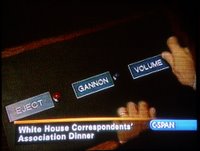From the New York Times:
John Kenneth Galbraith, the iconoclastic economist, teacher and diplomat and an unapologetically liberal member of the political and academic establishment that he needled in prolific writings for more than half a century, died yesterday at a hospital in Cambridge, Mass. He was 97.
. . .
Nearly 40 years after writing "The Affluent Society," Mr. Galbraith updated it in 1996 as "The Good Society." In it, he said that his earlier concerns had only worsened: that if anything, America had become even more a "democracy of the fortunate," with the poor increasingly excluded from a fair place at the table.
. . .
Mr. Galbraith said he inherited his liberalism, his interest in politics and his wit from his father. When he was about 8, he once recalled, he would join his father at political rallies. At one event, he wrote in his 1964 memoir "The Scotch," his father mounted a large pile of manure to address the crowd.
"He apologized with ill-concealed sincerity for speaking from the Tory platform," Mr. Galbraith related. "The effect on this agrarian audience was electric. Afterward I congratulated him on the brilliance of the sally. He said, 'It was good but it didn't change any votes.' "
At age 18 he enrolled at Ontario Agricultural College, where he took practical farming courses like poultry husbandry and basic plumbing. But as the Depression dragged down Canadian farmers, the questions of the way farm products were sold and at what prices became more urgent to him than how they were produced. . . .
. . .
Mr. Galbraith became an American citizen, and taught economics at Princeton in 1939. But after the fall of France in 1940, Mr. Galbraith joined the Roosevelt administration to help manage an economy being prepared for war. He rose to become the administrator of wage and price controls in the Office of Price Administration. Prices remained stable, but he grew controversial, drawing the constant fire of industry complaints. "I reached the point that all price fixers reach," he said, "My enemies outnumbered my friends."
He was forced to resign in 1943 and was rejected by the Army as too tall when he sought to enlist. . . .
. . .
He completed two books in 1952, "American Capitalism: The Concept of Countervailing Power" and "A Theory of Price Control." In "American Capitalism," he set out to debunk myths about the free market economy and explore concentrations of economic power. He described the pressures that corporations and unions exerted on each other for increased profits and increased wages, and said these countervailing forces kept those giant groups in equilibrium and the nation's economy prosperous and stable.
In his 1981 memoir, he said that though the basic idea was still sound, he had been "a bit carried away" by his notion of countervailing power. "I made it far more inevitable and rather more equalizing than, in practice, it ever is," he wrote, adding that often it does not emerge, with the result that "numerous groups — the ghetto young, the rural poor, textile workers, many consumers — remain weak or helpless."
. . .
"The Affluent Society" appeared in 1958, making Mr. Galbraith known around the world. In it, he depicted a consumer culture gone wild, rich in goods but poor in the social services that make for community. . . .
Anticipating the environmental movement by nearly a decade, he asked, "Is the added production or the added efficiency in production worth its effect on ambient air, water and space — the countryside?" Mr. Galbraith called for a change in values that would shun the seductions of advertising and champion clean air, good housing and aid for the arts.
. . .
When India became embroiled in a border war with China in the Himalayas in 1962, Ambassador Galbraith effectively took charge of both the American military and the diplomatic response during what was a brief but potentially explosive crisis. He saw to it that India received restrained American help and took it upon himself to announce that the United States recognized India's disputed northern borders.
. . .
After Kennedy was assassinated, Mr. Galbraith served as an adviser to President Johnson, meeting with him often at the White House or on trips to the president's ranch in Texas to talk about what could be accomplished with the Great Society programs. Mr. Galbraith said that Johnson had summoned him to write the final draft of his speech outlining the purposes of the Great Society, and that when the writing was done, said: "I'm not going to change a word. That's great."
. . .
In 1973 he published "Economics and the Public Purpose," in which he sought to extend the planning system already used by the industrial core of the economy to the market economy, to small-business owners and to entrepreneurs. Mr. Galbraith called for a "new socialism," with more steeply progressive taxes; public support of the arts; public ownership of housing, medical and transportation facilities; and the conversion of some corporations and military contractors into public corporations.
. . .
In 2004, Mr. Galbraith, who was then 95, published "The Economics of Innocent Fraud," a short book that questioned much of the standard economic wisdom by questioning the ability of markets to regulate themselves, the usefulness of monetary policy and the effectiveness of corporate governance.
He remained optimistic about the ability of government to improve the lot of the less fortunate. "Let there be a coalition of the concerned," he urged. "The affluent would still be affluent, the comfortable still comfortable, but the poor would be part of the political system."
Brad DeLong, who is quoted in the obituary, has more
here.















